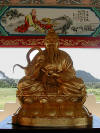|
Lao Tzu (老子)
Chinese. ‘Old Master’ or ‘old child’. An influential Chinese philosopher in the 4th century BC, founder of
Taoism and author of the
Tao-te Ching.
His name refers to his
birth, in which he –according to legend- emerged as a full-grown man, with white
hair and a full grey beard. Little is known about the life of Lao Tzu. In legend, it is said that he was
conceived when his mother gazed upon a falling star and he stayed in his
mother's womb where he matured for several decades (compare with
Phra Siwalih). His mother eventually gave
birth to a full-grown man, whilst leaning against a plum tree. Tradition says he
was born in Ku Xian (苦縣), a prefecture of the state of Chu (楚), today's Luyi
County (鹿邑) of the province of Henan (河南), ‘South of the Yellow River’. Some
biographies claim that Lao Tzu was a contemporary of
Confucius
and worked as keeper of the archives in the Imperial Library of the royal court
of the
Zhou Dynasty (周朝), where he supposedly met with Confucius, but modern
scholars place him centuries later. Lao Tzu is said to have married and had a
son who was a renowned soldier. His philosophy distinguishes knowledge from
wisdom and promotes simplicity, integrity, compassion and modesty. He believed
that it was better to adapt oneself spontaneously to the circumstances of life,
rather than to worry, to force or to try to get hold on things, claiming that
acts without striving will keep things in balance, like reed bending in the
wind. Although he never opened a formal school he attracted a large number of
loyal apprentices and disciples, and many contacted him for his advice.
Traditional accounts state that Lao Tzu grew weary of the moral decay of the
kingdom and at the age of 160, he ventured West on his water
buffalo through the state of Qin
(秦), where he disappeared into the vast desert, leaving
China
(fig.)
and starting his secluded life as a hermit. In this period of his life he
allegedly wrote his book, the Tao-te Ching, a record of his wisdom said to be
produced on the request of a guard at the westernmost gate of the kingdom. In
some versions of the tale, the guard was so impressed by Lao Tzu that he leaves
his post to accompany the old master on his journey and was never seen again. In
his deified form, he is referred to as
Lao Jun
(fig.).
Lao Tzu is also transcribed Lao Zi.
回






|

